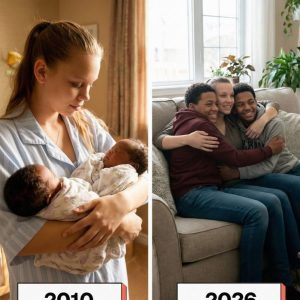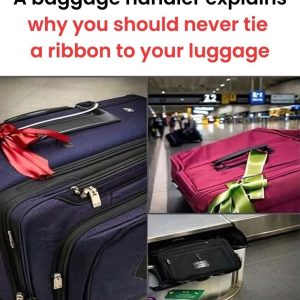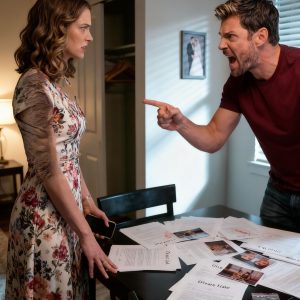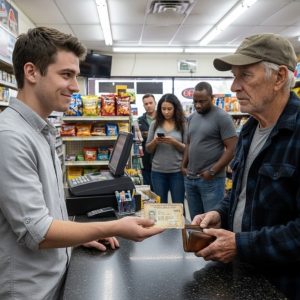I proposed to my girlfriend during her family gathering. When she saw the ring, she frowned and snapped loudly, “Is this all I’m worth?” I was 21 and couldn’t afford more. I never saw her again. Two weeks later, her dad called in tears. He said, “Son…”
I still remember my hand shaking when I pulled that little velvet box from my pocket. Her family was all around—cousins, uncles, her grandmother in the corner chair crocheting like she wasn’t eavesdropping but totally was. I thought it’d be sweet. I thought they’d clap. I thought she’d cry.She did cry. Just not the way I expected.
The ring wasn’t flashy. I’d saved for months—tutoring high school kids after my classes, working weekend shifts at my uncle’s car wash. It was modest but real. A small, classic diamond on a silver band. I thought it was perfect.
“Is this all I’m worth?” she said, louder than needed. Then she just stood there, glaring at the ring like it insulted her personally. Her mom looked away. Her aunt made a sound between a gasp and a sigh.
I tried to explain, whispering that I wanted to marry her, not buy her. She rolled her eyes, muttered something about how I’d “never make it” and walked out.
That was the last time I saw her.
Two weeks later, her dad called. I hadn’t saved his number, so I almost didn’t pick up. He was crying. Full-on sobbing. The kind that makes your stomach twist before you even know what’s wrong.
“Son,” he said, his voice cracking, “I’m sorry. I—I need to tell you something.”
I didn’t know what to say. I just sat on the edge of my bed, listening.
“Catarina’s gone,” he said. “She… she got into an accident last night. Driving too fast. Lost control.”
I felt like the air got sucked out of my lungs.
We hadn’t talked in two weeks. No texts, no calls. I’d thought about reaching out, maybe trying again—but pride held me back. Her words still rang in my head. Is this all I’m worth?
Now she was gone. Just like that.
The funeral was quiet. Her family invited me, and I went, unsure what to feel. Sadness, sure—but also confusion, guilt, anger. I stood at the back, wearing the only black suit I owned, listening to the priest talk about forgiveness and fragility.
Afterward, her dad pulled me aside. He looked older. Tired.
“I want you to have this,” he said, pressing a small envelope into my hand. “She kept it. The ring. We thought she threw it away, but…”
I opened it that night. The ring was still there, in the same box, tucked inside the envelope. And a note. In her handwriting.
“I was cruel. You deserved better. I didn’t know how to love someone real. I’m sorry.”
I stared at those words for a long time. Read them again. And again.
Life kept moving after that.
I dropped out of school a year later—not because of Catarina, but because I couldn’t afford tuition anymore. My mom got sick. Bills piled up. I worked two jobs, sometimes three, and sleep became a luxury I couldn’t afford.
But I kept the ring. I didn’t wear it or display it. Just kept it in a shoebox under my bed. A reminder, maybe. A wound I didn’t want to forget.
Years passed. I moved cities. Started a small landscaping business. Nothing fancy—just me, a borrowed pickup, some tools, and flyers I stuck on mailboxes.
I didn’t think about love much. There wasn’t time.
Then came Amaia.
She was a client at first. Wanted help redoing her front yard. Said the old rose bushes reminded her too much of her ex. I didn’t ask questions. Just showed up with a shovel and tried not to stare at how kind her eyes looked.
She brought me lemonade the first day. On the second, she brought cookies. On the third, she asked what I was doing for lunch.
By the time her yard was done, I knew her favorite movie, the name of her dog who passed last year, and that she made a mean arroz con pollo.
We started slow. Coffee dates. Walks. Lots of talking. She asked about my past once, and I told her, but not everything. Some stories stay folded for a reason.
She was nothing like Catarina.
Amaia didn’t care that I drove a rusty truck or that I wore the same three work shirts in rotation. She asked about my mom, brought soup when I was sick, and sat with me in silence when I didn’t feel like talking.
Three years later, I proposed.
This time, no big crowd. Just her, me, a park bench, and the same ring.
She didn’t ask how much it cost. She just looked at me and said, “Yes,” before I could finish my speech.
We got married in her cousin’s backyard. Small, but full of love. Her dad grilled. My mom cried. It was perfect.
We had our struggles. Money was tight some months. The plumbing never seemed to work. Our first car broke down more times than I could count.
But Amaia never once made me feel “less than.”
And I made a promise to never let pride get in the way again.
Ten years after Catarina’s death, I got another unexpected call—from her younger sister, Lourdes.
I barely recognized her voice. She was only fifteen back when it happened. Now in her mid-twenties, living in the same city as me.
“I saw your business online,” she said. “It’s doing well, huh?”
I laughed. “Still got dirt under my nails, but yeah. It’s alright.”
She got quiet. Then said, “I found something of Cat’s. Thought you should have it.”
We met at a café. She handed me an old journal, worn at the edges.
“I don’t know if she meant to keep it hidden,” she said. “But you’re in here. A lot.”
Back home, I opened it.
Catarina wrote about our early dates, our fights, the proposal. She’d been embarrassed. Not just by the ring—but by herself.
“I wanted to say yes,” one entry read. “But I didn’t know how to be vulnerable in front of all those people. So I lashed out.”
Another: “He deserved someone kind. Someone who didn’t care about shiny things. I’m scared I’ll never be that person.”
I sat with the journal in my lap, heart heavy but strangely lighter at the same time.
She hadn’t hated me. She’d hated herself.
That night, I told Amaia everything. She listened, then hugged me long and hard.
“Maybe you were meant to love her first,” she said. “So you could learn how to love better after.”
That hit me deep.
The next day, I took the ring to a jeweler and had it cleaned. Then, without telling Amaia, I had it melted down and reshaped. Same diamond, new setting.
I gave it back to her on our anniversary.
She blinked, confused. “Didn’t we already do this whole proposal thing?”
I smiled. “Yeah. But this is our version now. No ghosts. Just us.”
We danced in the kitchen that night, barefoot, to a scratchy old radio. The kind of moment no camera could ever capture right.
People talk about love like it’s this grand, sweeping thing. But most days, it looks like washing dishes together, taking turns waking up with the baby, forgiving each other before bed.
If there’s one thing I’ve learned, it’s this:
Not every broken thing is meant to be thrown away. Some just need time. A different kind of light. A second look.
Sometimes, you think the story ends with heartbreak. But it doesn’t.
Sometimes, the best love story comes after the worst goodbye.
If this touched something in you, give it a share or a like. You never know who might need the reminder.






